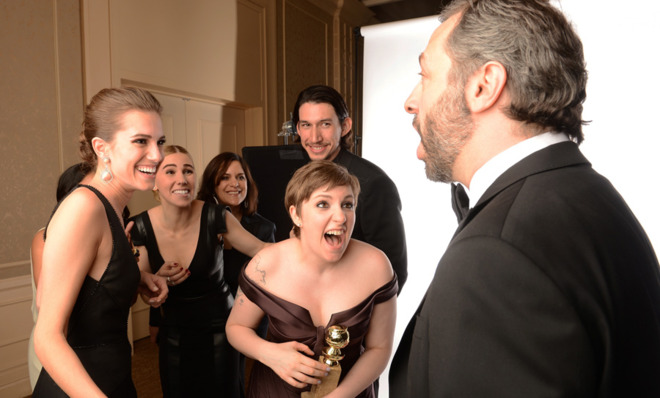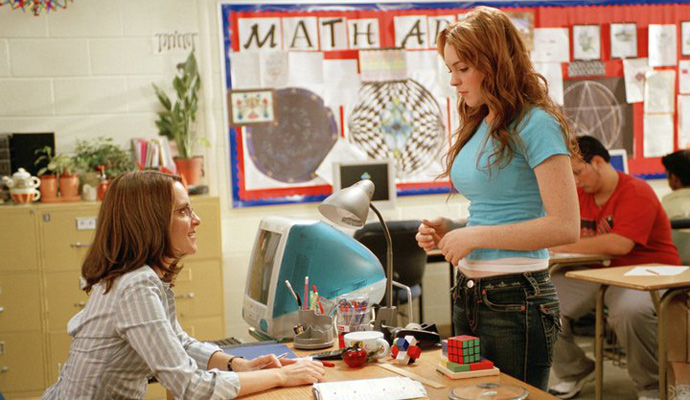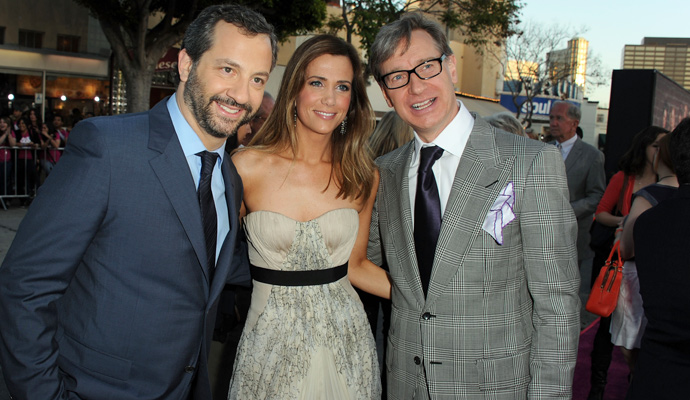Girls on Film: Aspiring female filmmakers need male mentors, too
Hollywood's creative elite have relied on established mentors for decades — but women have rarely been a part of the equation


A free daily email with the biggest news stories of the day – and the best features from TheWeek.com
You are now subscribed
Your newsletter sign-up was successful
To become a Hollywood power player, you need a good mentor.
When Steven Spielberg accepted the Cecil B. DeMille award, he stressed: "None of the movies I've made throughout my whole life would have been possible [...] without someone believing in me." He noted that Noel Coward mentored David Lean. Roger Corman mentored Francis Ford Coppola (as part of the large "Corman Film School"). Coppola then mentored George Lucas, who then mentored Ron Howard. Spielberg himself helped Robert Zemeckis, who in turn sponsored Peter Jackson. "We all had a hand pulling each other up in life."
The list goes on and on. Mike Nichols mentored Steven Soderbergh; Don Siegel mentored Clint Eastwood; Tony Scott mentored Quentin Tarantino, who in turn mentored Eli Roth; Terrence Malick mentored David Gordon Green..
The Week
Escape your echo chamber. Get the facts behind the news, plus analysis from multiple perspectives.

Sign up for The Week's Free Newsletters
From our morning news briefing to a weekly Good News Newsletter, get the best of The Week delivered directly to your inbox.
From our morning news briefing to a weekly Good News Newsletter, get the best of The Week delivered directly to your inbox.
At this point, you've probably noticed something about the demographics of that list: They're all men.
Study after study has shown that Hollywood's gender imbalance has not changed. Not after years; not even after decades. In some cases, the numbers have actually grown worse, as women struggle to find footing in the industry despite articles claiming that Tinseltown's glass ceiling has been smashed after an Academy Award win or a box office success.
Sadly, female-led mentoring initiatives have fizzled.
Dazed & Confused's new film project "Females First" was created to facilitate mentorship between successful women in the industry and new female directorial talent. The established — including Jane Campion and Sienna Miller — pick their favorite new director, and the company gives them a few thousand pounds to put toward a film that will be published on Dazed's website.
A free daily email with the biggest news stories of the day – and the best features from TheWeek.com
In theory, it's a great idea; more people should be pushing to get female filmmakers the same mentorship access as their male counterparts. Unfortunately, all you get from Females First is a very tiny amount of money and the chance to screen a film online. That's no different than what's available to pretty much any other amateur filmmaker, who can achieve the same results with a credit card and YouTube. In fact, the initiative’s first release immediately breaks its own rules with an award-winning short that was already made and screened — Anahita Ghazvinizadeh’s Needle, which won much more at Cannes last year through a juried prize led by Campion.
Women in Film Los Angeles offers two programs: mentoring circles and (believe it or not) "speed mentoring." For the latter, participants get seven minutes per person. It's a quick way to get advice, but not ongoing mentorship. In fact, a piece covering the event showed that participants were encouraged to stay out of the system, funding projects on their own or sticking with web video.
Then there's the DGA, which only really mentors and aids "active DGA members in good standing" who are "working in the trade." The bylaws say this means members who have worked "during the initial seven-year period following the time the individual becomes a member of the Guild; and at any time after this initial seven-year period only if the individual has worked at least a total of 30 days under a Guild collective bargaining agreement during the most recent seven-year period." In short, DGA isn't going to mentor you and help you find work unless you already have work.
But there is a heartening exception to Hollywood's mentorship problem: comedy. In just five years, the genre has evolved from a landscape free of big-screen comediennes to a world where women thrive on both the big and small screens.

The revolution was television. The new era began in 1999, as Lorne Michaels brought Tina Fey into the Saturday Night Live fold as head writer. Their collaboration led to the cult classic Mean Girls, a femme-centric "Weekend Update" with Amy Poehler, and — once Fey left SNL — her own TV show, 30 Rock.
Film took longer, but the results were no less potent. Judd Apatow, who made the stars of his short-lived Freaks and Geeks into the comedy kings of Hollywood, found his biggest success ever with Bridesmaids, the women-centric film written by Kristen Wiig and Annie Mumolo. Bridesmaids beat out his entire roster at the box office when it raked in almost $170 million. But rather than considering Bridesmaids an anomaly, Apatow learned from it. The man who was facing complaints about his female characters started actively, and continually, mentoring women and aiding their rises — to great success. He learned it from Gary Shandling, and he's now paying it forward.
After helping Wiig with the perfect post-SNL vehicle — which reminded the world of Melissa McCarthy's many talents and made her a scene-stealing comedic star — Apatow zeroed in on Lena Dunham, a young filmmaker with the breakout indie hit Tiny Furniture under her belt. With his help, Dunham went from indie filmmaker to HBO showrunner. Apatow has now turned his attentions to Amy Schumer by directing and producing her first screenplay, Trainwreck.
Then there's director Paul Feig, Apatow's long-time collaborator, who directed Bridesmaids, bolstered McCarthy's star power with the gender-bending buddy cop film The Heat, and will boost it again with their upcoming spy caper, Susan Cooper. McCarthy, in turn, is already prepping the release of her first writer/producer/star comedy, Tammy.
By fostering female talent, this trio of men — Michaels, Apatow, and Feig — have managed to change the course of comedy. Why haven’t more men in Hollywood followed their lead? According to inside sources, one of the big problems seems to be the Lolita Effect — men are actually scared that honest collaboration will look like sexual impropriety rather than work.

Since working women already need to fight just to keep the small slice of the diminishing pie that they have, they're not the ideal vehicles for women to get a leg up in the industry. It is, therefore, up to men in the industry to step up. The results are obvious: Michaels, Apatow, and Feig have used their position to help a number of women find the success their talents deserve. Just as importantly, these men found greater successes themselves by helping women.
The well-intentioned programs that give a couple thousand bucks to young female filmmakers have their place. They can certainly inspire good work, and open the gate to Hollywood. But in the end, they're only a first step that must be followed by mentors who can actually help women find real, paying work. There's no reason to keep pushing women to want to direct if they're just going to have to fight for scraps once they get there.
Men in power have to be willing to help. Fellowships have to lead to work, and not just act as PR machines that make studios look good without providing actual opportunities. Mentorship programs must continue to offer the hand that pulled Hollywood's iconic directors, in the words of Spielberg, "up in life."
Girls on Film is a weekly column focusing on women and cinema. It can be found at TheWeek.com every Friday morning. And be sure to follow the Girls on Film Twitter feed for additional femme-con.
Monika Bartyzel is a freelance writer and creator of Girls on Film, a weekly look at femme-centric film news and concerns, now appearing at TheWeek.com. Her work has been published on sites including The Atlantic, Movies.com, Moviefone, Collider, and the now-defunct Cinematical, where she was a lead writer and assignment editor.
-
 The Week Unwrapped: Do the Freemasons have too much sway in the police force?
The Week Unwrapped: Do the Freemasons have too much sway in the police force?Podcast Plus, what does the growing popularity of prediction markets mean for the future? And why are UK film and TV workers struggling?
-
 Properties of the week: pretty thatched cottages
Properties of the week: pretty thatched cottagesThe Week Recommends Featuring homes in West Sussex, Dorset and Suffolk
-
 The week’s best photos
The week’s best photosIn Pictures An explosive meal, a carnival of joy, and more
